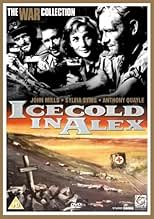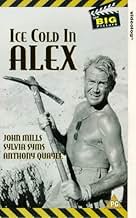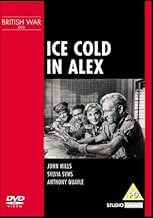Adicionar um enredo no seu idiomaDuring World War II in North Africa, a medical field unit must cross the desert in their ambulance in order to reach the British lines in Alexandria.During World War II in North Africa, a medical field unit must cross the desert in their ambulance in order to reach the British lines in Alexandria.During World War II in North Africa, a medical field unit must cross the desert in their ambulance in order to reach the British lines in Alexandria.
- Direção
- Roteiristas
- Artistas
- Indicado para 4 prêmios BAFTA
- 1 vitória e 5 indicações no total
- Corporal
- (não creditado)
Avaliações em destaque
Anthony Quayle acted his part with perfection, staying both loyal to his own cause, AND to the common cause of survival.
He did not turn anybody over to the German army despite the many opportunities, but turned each incident into an advantage that helped all concerned.
Also the matter of alcoholic addiction was portrayed excellently by John Mills, and the self-realisation which led to his overcoming of the problem was quite poignant.
Overall I would recommend this film as one of the classics amongst war-theme movies. It gets behind the scenes and down to the really important matter of real people and THEIR perspective of things.
The subplot of the commonality of humanity, together with the final denouement adds to my enjoyment.
As an Englishman living in Australia, I appreciate, especially the final scene in the club. I never fail to relish a glass of beer, or to finger-wipe the condensation on the glass.
(PS I would have made it 10 out of 10 if Miss Syms could have unhooked two more buttons on her shirt)
The interplay between the characters and the growing bond they have in adversity is well played by the actors. John Mills' deeply troubled captain is particularly well acted. Harry Andrews, Anthony Quayle and Sylvia Syms are fine too. The other main character is the ambulance itself, gradually coming to pieces on the way, steaming and bumping along.
J. Lee Thompson was a very able director and there are some excellent scenes here. The minefield scene near the beginning and the hill scene near the end are great, tense and emotional. The beer scene is moving and uplifting. The best British films about the Second World War are generally about a small group of ordinary people who faced with crisis and peril just get on with it.
Você sabia?
- CuriosidadesFilmed in Libya, as Egypt was ruled out due to the recent Suez Crisis. Filming began 10 September 1957.
- Erros de gravaçãoIn the very last scene, as Lutz is being driven away from the bar by the British military police, a Land Rover can be seen parked next to the bar. The first Land Rovers were produced in 1948, six years after the battle of Tobruk.
- Citações
Capt. Anson: I'll tell you this, the next drink I have's gonna be a lager. Ice cold. There's a little bar in Alex with a marble top counter and high stools. They serve the best beer in all the middle east. When we get through with this lot I'm gonna buy you one. I'll buy you all one.
- Cenas durante ou pós-créditosOpening credits prologue: TOBRUK - 1942
- Versões alternativasOriginal British version, "Ice Cold in Alex," runs 130 minutes. U.S. distributor shortened the film in 1961 to 76 minutes and released it as "Desert Attack."
- ConexõesFeatured in Hollywood U.K. British Cinema in the Sixties: A Very British Picture (1993)
- Trilhas sonorasMy Old Man (Said Follow the Van)
[uncredited]
Written (1919) by Fred W. Leigh and Charles Collins
Sung by John Mills, Sylvia Syms and Harry Andrews
Principais escolhas
- How long is Ice Cold in Alex?Fornecido pela Alexa
Detalhes
- Tempo de duração2 horas 10 minutos
- Cor
- Proporção
- 1.66 : 1
Contribua para esta página





































